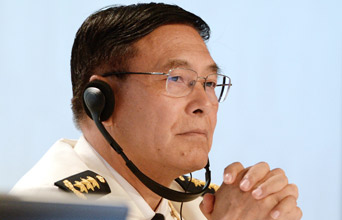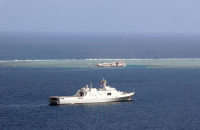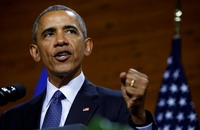A seminar on the South China Sea Arbitration and International Rule of Law was held on Sunday in the Hague, the location of the Permanent Court of Arbitration's arbitral tribunal. At the seminar hosted by both Chinese and Dutch academic institutions, experts from various countries warned that the unilateral filing of the South China Sea arbitration case by the Aquino administration of the Philippines and the arbitral tribunal’s overreach and abuse of power is a desecration of the spirit of the rule of law and pose a threat to current international order.
A legal expert at the University of Oxford has published a paper on resolving disputes in the South China Sea. It relates to the arbitration unilaterally initiated by the Philippines against China.
With this move, the Philippines is just adorning itself with borrowed plumes. First of all, estoppel is a basic principle of international law. As is known to all, China and ASEAN countries, including the Philippines, signed the Declaration on the Conduct of Parties in the South China Sea (DOC) in 2002, in which all sides agreed to settle disputes over the South China Sea through friendly negotiation and consultation by parties directly concerned.
A group of experts on international law have called the arbitration that was unilaterally filed by the Philippines against China over the South China Sea "questionable".
In 2011, the Philippines and China issued a joint statement, reiterating their respect and observation of the DOC. However, just two years later, the Aquino administration unilaterally submitted the South China Sea case for arbitration in spite of its previous commitments.
Secondly, the Philippines ignores basic historical facts by presumptuously claiming that the Chinese people never lived or conducted activities in the South China Sea region, thus bearing no sovereignty over the islands in the region.
Cambodia's ruling party has spoken out against the arbitration court's upcoming decision over the South China Sea issue.
Yet no one can deny the historical fact that those islands have been part of China’s territory since ancient times. Successive Chinese governments have continued to govern the islands through multiple approaches including setting administrative divisions, military patrols and conducting salvages at sea.
Respecting historical fact is an important principle of international law. Through its lack of respect for the facts, the South China Sea case violates this principle.
Chinese Foreign Ministry spokesman Hong Lei has condemned Japan's remarks over the South China Sea arbitration unilaterally launched by the Philippines. He urged for Japan to stop making such irresponsible remarks.
Moreover, the Philippines’ interpretation of the legal status of the islands and reefs in the South China Sea is not in line with the United Nations Convention on the Law of Sea (UNCLOS) and other international laws.
The requests raised by the Philippines in the arbitration case are, in essence, about territorial sovereignty and maritime demarcation.
The Southeast Asian nation claims that the Huangyan Island and the Nansha islands cannot be considered islands as such no one can establish exclusive economic zones or claim the continental shelves there. Such an argument flies in the face of objective reality.
The Philippines deliberately misrepresented factual information about the islands and reefs in the South China Sea during the trial and carelessly negated the integrity of the Nansha islands as well as the island status of Taiping Island and other large islands in area. However, its claims are not only inconsistent with reality, but also incompatible with UNCLOS and other international laws.
The legal representatives of the Philippines also withheld necessary information concerning other islands in the South China Sea (not included in its arbitration request) on purpose, and refused to present them to the court. It is safe to say that the Philippines’ argument concerning the South China Sea islands and reefs lacks basic credibility.
Taking this into consideration, the arbitral tribunal has clearly violated UNCLOS, abused the UNCLOS settlement procedure and exceeded its jurisdiction by accepting the unilateral request of the Philippines and even trying to deliver a verdict on the South China Sea issue. Its self-proclaimed “jurisprudence” and “normative power” demonstrate great irony.
The core of the South China Sea issue between China and the Philippines are territorial and maritime delimitation disputes. Territorial issues do not fall within the scope of UNCLOS authority. Additionally, as early as 2006, China has excluded compulsory settlement procedures from maritime delimitation disputes in accordance with Article 298 of UNCLOS.
As a temporary institution founded on UNCLOS, the tribunal has zero jurisdiction over this case. Arbitration and other international judicial methods to resolve disputes means resorting to third-party settlement. However, this option has already been excluded by internationally binding bilateral agreements between China and the Philippines.
The tribunal chose to ignore these binding documents and breached the premises, exclusions and exceptions for compulsory settlement procedure stipulated in UNCLOS to establish jurisdiction on its own.
The tribunal’s blatant disregard for the agreement China and the Philippines made concerning settling disputes has irresponsibly broken the consensus reached between the two states and has seriously violated China’s right as a sovereign state and UNCLOS signatory to choose its own dispute settlement method.
What’s more, by repeatedly referencing UNCLOS and extending the convention’s coverage to all maritime issues, the tribunal has in fact turned a blind eye to conventional international law.
Any practitioner of international law is aware that articles in UNCLOS are a summary of the historical maritime practices and common will of all countries. UNCLOS shows nothing but respect to conventional international law. However, the tribunal today has discredited all previous practices, contradicting the basic purpose and spirit of UNCLOS.
International law has played a significant role in maintaining a relatively stable international order after World War II. In the decades after the war, hundreds of international treaties were drafted to regulate the conduct of states and people’s lives.
From the planet where we live to outer space, from security to arms control, from economic development to environmental protection, from human rights to judicial cooperation and other areas, these international laws are ubiquitous. The diplomatic actions of every county call for international law. In other words, it is a commonly recognized standard for the international community. The world would fall into chaos without it, and the law of the jungle would once again dominate.
Therefore, the abuse of international law by the Philippines and the tribunal has undermined the authority of the law, which will in turn greatly impact the stability of international order.
It is worth mentioning that the US, a country outside the region, has been eager to play a hand in the issue. Those who are familiar with the “America-style” of dealing with international affairs know that “safeguarding the integrity of international law” is a catchphrase for the country when it comes to international dealings.
However, as a country that attaches such importance to the protection of international law, why has the US supported the illegal acts of the Philippines and the tribunal? The answer is simple: The US only protects those international laws that benefit itself. In the eyes of the US, any illegal act can be considered “an act that protects international law” so long as it benefits its own strategic interests.
A scholar at the seminar pointed out that what the Philippines has done to China today could happen to other countries in the future. If the tribunal comes to a conclusion that does not conform to the facts and the law, then the same twisted logic could be misapplied to other countries with territorial disputes.
Such apprehension is not without merit. If the irresponsible actions of the Philippines, the US and the arbitral tribunal are not faced head on, they will severely affect the authority of international law. From this perspective, China's fight against the abuse of international law is not only the country safeguarding its territorial sovereignty, but also a contribution to lasting peace and stability in the world. - People daily
Related:
Who is sterring up trouble in the South China Sea
Related posts:

China urges Philippines to quit arbitration; Pushes back against US ...

 Exclusive interview: Limitation of UNCLOS Dispute Settlement System
Exclusive interview: Limitation of UNCLOS Dispute Settlement System
A legal expert at the University of Oxford has published a paper on resolving disputes in the South China Sea. It relates to the arbitration unilaterally initiated by the Philippines against China.With this move, the Philippines is just adorning itself with borrowed plumes. First of all, estoppel is a basic principle of international law. As is known to all, China and ASEAN countries, including the Philippines, signed the Declaration on the Conduct of Parties in the South China Sea (DOC) in 2002, in which all sides agreed to settle disputes over the South China Sea through friendly negotiation and consultation by parties directly concerned.
 Experts call for reasonable and effective dialogue on China South Sea issue
Experts call for reasonable and effective dialogue on China South Sea issue
A group of experts on international law have called the arbitration that was unilaterally filed by the Philippines against China over the South China Sea "questionable".In 2011, the Philippines and China issued a joint statement, reiterating their respect and observation of the DOC. However, just two years later, the Aquino administration unilaterally submitted the South China Sea case for arbitration in spite of its previous commitments.
Secondly, the Philippines ignores basic historical facts by presumptuously claiming that the Chinese people never lived or conducted activities in the South China Sea region, thus bearing no sovereignty over the islands in the region.
 Cambodia criticizes arbitration filed by Philippines
Cambodia criticizes arbitration filed by Philippines
Cambodia's ruling party has spoken out against the arbitration court's upcoming decision over the South China Sea issue.Yet no one can deny the historical fact that those islands have been part of China’s territory since ancient times. Successive Chinese governments have continued to govern the islands through multiple approaches including setting administrative divisions, military patrols and conducting salvages at sea.
Respecting historical fact is an important principle of international law. Through its lack of respect for the facts, the South China Sea case violates this principle.
 Chinese Foreign Ministry condemns Japan
Chinese Foreign Ministry condemns Japan
Chinese Foreign Ministry spokesman Hong Lei has condemned Japan's remarks over the South China Sea arbitration unilaterally launched by the Philippines. He urged for Japan to stop making such irresponsible remarks.Moreover, the Philippines’ interpretation of the legal status of the islands and reefs in the South China Sea is not in line with the United Nations Convention on the Law of Sea (UNCLOS) and other international laws.
 South China Sea FAQ ep12: Why does Beijing reject Manila's arbitration case?
South China Sea FAQ ep12: Why does Beijing reject Manila's arbitration case?
The requests raised by the Philippines in the arbitration case are, in essence, about territorial sovereignty and maritime demarcation.The Southeast Asian nation claims that the Huangyan Island and the Nansha islands cannot be considered islands as such no one can establish exclusive economic zones or claim the continental shelves there. Such an argument flies in the face of objective reality.
South China Sea FAQ ep13: China's solution for resolving the disputes
- South China Sea FAQ ep13: China's solution for resolving the disputes. As tensions in the South China Sea region continue, China continues to insist on a dual-track approach to resolve disputes. This is governed by the Declaration on the Conduct of Parties in the South China Sea made in 2002 between China...
The Philippines deliberately misrepresented factual information about the islands and reefs in the South China Sea during the trial and carelessly negated the integrity of the Nansha islands as well as the island status of Taiping Island and other large islands in area. However, its claims are not only inconsistent with reality, but also incompatible with UNCLOS and other international laws.
The legal representatives of the Philippines also withheld necessary information concerning other islands in the South China Sea (not included in its arbitration request) on purpose, and refused to present them to the court. It is safe to say that the Philippines’ argument concerning the South China Sea islands and reefs lacks basic credibility.
Taking this into consideration, the arbitral tribunal has clearly violated UNCLOS, abused the UNCLOS settlement procedure and exceeded its jurisdiction by accepting the unilateral request of the Philippines and even trying to deliver a verdict on the South China Sea issue. Its self-proclaimed “jurisprudence” and “normative power” demonstrate great irony.
The core of the South China Sea issue between China and the Philippines are territorial and maritime delimitation disputes. Territorial issues do not fall within the scope of UNCLOS authority. Additionally, as early as 2006, China has excluded compulsory settlement procedures from maritime delimitation disputes in accordance with Article 298 of UNCLOS.
As a temporary institution founded on UNCLOS, the tribunal has zero jurisdiction over this case. Arbitration and other international judicial methods to resolve disputes means resorting to third-party settlement. However, this option has already been excluded by internationally binding bilateral agreements between China and the Philippines.
The tribunal chose to ignore these binding documents and breached the premises, exclusions and exceptions for compulsory settlement procedure stipulated in UNCLOS to establish jurisdiction on its own.
The tribunal’s blatant disregard for the agreement China and the Philippines made concerning settling disputes has irresponsibly broken the consensus reached between the two states and has seriously violated China’s right as a sovereign state and UNCLOS signatory to choose its own dispute settlement method.
What’s more, by repeatedly referencing UNCLOS and extending the convention’s coverage to all maritime issues, the tribunal has in fact turned a blind eye to conventional international law.
Any practitioner of international law is aware that articles in UNCLOS are a summary of the historical maritime practices and common will of all countries. UNCLOS shows nothing but respect to conventional international law. However, the tribunal today has discredited all previous practices, contradicting the basic purpose and spirit of UNCLOS.
International law has played a significant role in maintaining a relatively stable international order after World War II. In the decades after the war, hundreds of international treaties were drafted to regulate the conduct of states and people’s lives.
From the planet where we live to outer space, from security to arms control, from economic development to environmental protection, from human rights to judicial cooperation and other areas, these international laws are ubiquitous. The diplomatic actions of every county call for international law. In other words, it is a commonly recognized standard for the international community. The world would fall into chaos without it, and the law of the jungle would once again dominate.
Therefore, the abuse of international law by the Philippines and the tribunal has undermined the authority of the law, which will in turn greatly impact the stability of international order.
It is worth mentioning that the US, a country outside the region, has been eager to play a hand in the issue. Those who are familiar with the “America-style” of dealing with international affairs know that “safeguarding the integrity of international law” is a catchphrase for the country when it comes to international dealings.
However, as a country that attaches such importance to the protection of international law, why has the US supported the illegal acts of the Philippines and the tribunal? The answer is simple: The US only protects those international laws that benefit itself. In the eyes of the US, any illegal act can be considered “an act that protects international law” so long as it benefits its own strategic interests.
A scholar at the seminar pointed out that what the Philippines has done to China today could happen to other countries in the future. If the tribunal comes to a conclusion that does not conform to the facts and the law, then the same twisted logic could be misapplied to other countries with territorial disputes.
Such apprehension is not without merit. If the irresponsible actions of the Philippines, the US and the arbitral tribunal are not faced head on, they will severely affect the authority of international law. From this perspective, China's fight against the abuse of international law is not only the country safeguarding its territorial sovereignty, but also a contribution to lasting peace and stability in the world. - People daily
Related:
Who is sterring up trouble in the South China Sea
Related posts:
China urges Philippines to quit arbitration; Pushes back against US ...
Jun 9, 2016 ... China urges Philippines to quit arbitration; Pushes back against US ... SINGAPORE: China rebuffed US pressure to curb its activity in the South ...
Jun 6, 2016 ... Analysts pooh-pooh US Defence Secretary's 'self-isolation' as an ... China "self- isolation" claims at best "exaggerated," said Huang Jing, ...





























